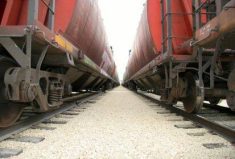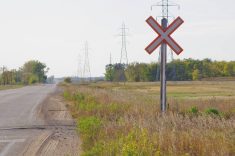The National Farmers Union (NFU) fears Bill C-49, the Transportation Modernization Act, will further deregulate the railways, resulting in poorer service for western Canadian grain farmers, not better.
The opposite view is held by most farm groups, grain companies and even the railways, all of whom want the legislation to revise the Canada Transportation Act currently before the Senate, quickly amended and passed.

“I am particularly concerned about the (Canadian Transportation) Agency’s assessment of the statutory level of service as common carrier obligations,” former NFU president Terry Boehm said in an interview March 16. “There could be enough latitude and leeway the railways would probably almost never be found at fault for not fulfilling their (service) obligations. The railways can make arguments… that they are making reasonable efforts. The appointees to the transportation agency will probably rule that, that is indeed the case.”
The NFU also wants C-49 amended to keep producer cars, used by farmers to bypass grain elevators, viable.
- Read more: NFU has plan to bolster producer cars
Read Also

Mazergroup’s Bob Mazer dies
Mazergroup’s Bob Mazer, who helped grow his family’s company into a string of farm equipment dealerships and the main dealer for New Holland machinery in Saskatchewan and Manitoba, died July 6 from cancer.
C-49 won’t be a panacea supporters say, but they believe it will be a step forward in mimicking the discipline of a competitive rail market.
“C-49 locks in another step forward in getting better rail service and if it’s inadequate we will work to build on the legislation to make more progress,” Wade Sobkowich, executive director of the Western Grain Elevator Association (WGEA), said an interview March 23.
WGEA members buy and ship most of the West’s grain to foreign and domestic markets.
Grain is captive to the railways, Sobkowich said. The railways have no financial incentive to invest in surge capacity, the lack of which resulted in the current and previous grain backlogs.
Under C-49 railways will be obliged to sign service agreements with grain shippers and subject to penalties if they fail to provide the service promised. It’s referred to as ‘reciprocal penalties’ as grain shippers are penalized by the railways now if they don’t load or unload cars as quickly as promised.
“The reciprocal penalty thing, I’ve never been a fan of that just because of the power dynamics of the railways,” said Boehm, who farms near Allan, Sask.
“How do you do that with the railways in the driver seat, even if you are a big grain company? How would you define an appropriate penalty against the railway that you are absolutely dependent on to do business?”
The NFU’s concerns about C-49 are in a brief presented to the Senate’s transport and communication’s committee on Feb. 17.
The Canada Transportation Act currently states clearly what the railways’ common carrier obligations are. If a shipper makes a level-of-service complaint, the CTA is required to determine whether or not the common carrier obligation has been met.
“It is cut and dried,” the brief says.
But according to the NFU, Bill C-49 amends Section 116 of the Transportation Act, allowing the CTA to diminish the railway companies’ obligation.
“The CTA can rule that a railway is fulfilling its service obligations if it is providing ‘the highest level of service in respect of those obligations that it can reasonably provide in the circumstances,’” the brief says.
C-49 lists factors the CTA should take into consideration, including the traffic to which the service obligations relate, the reasonableness of the shipper’s requests, and any information the CTA considers relevant.
“Thus, in the event of a level-of-service complaint, instead of ruling yes or no, Bill C-49 would give the CTA permission to rule ‘almost’ or ‘no, but at least you tried,’” the brief says. “The railway company would then be off the hook for providing full service to all Canadians, and some shippers would have to put up with poor, or no service.”
C-49 supporters admit the legislation’s effectiveness won’t be known until it becomes law. It’s expected level-of-service agreements, at least to start, will likely require arbitration as railways and shippers try to negotiate contracts both can live with.
“From my perspective I don’t have a lot of faith in the process,” Boehm said.
Meanwhile, C-49 supporters are pushing to get the bill passed.
“It needs to be done this year to get ready for next year… because we need to start next year in a lot better place than we have been in this year,” Rick White, CEO of the Canadian Canola Growers Association told the House of Commons agriculture committee March 19 during an emergency meeting on the grain shipping backlog.
Even railway officials said they wanted C-49 passed quickly.
“We don’t think of C-49 as a perfect bill,” Jeffrey Ellis, CP Rail’s chief legal officer and corporate secretary, told the committee. “We think it’s a compromise and an appropriate one. But from our perspective we are eager to go forward and make a capital investment in hopper cars, which is going to increase capacity in the network for grain for the foreseeable future. We stand ready to deploy anywhere from $1.3 billion to $1.5 billion over 2018 as soon as we can get the certainty that we need that the bifurcation that is presently within C-49 will come into play.”
C-49 rectifies a shortcoming in the current act that doesn’t allow the railways to individually get credit under the maximum revenue entitlement (MRE) for their investments.
“CN’s position is very clear. Pass it (C-49) as soon as possible,” Sean Finn, CN Rail’s executive vice-president of corporate services and chief legal officer told the committee.
The benefits of the legislation are twofold, he said.
“First of all it will provide additional tools to our customers to hold the railways more accountable, which is not a bad thing by itself,” Finn said. “I think we’re all here today because we recognize we have to be a lot more accountable towards both Parliament, but also our customers. And second… there’s no doubt that this will allow us to better prepare.”
C-49 requires that additional data is collected on grain shipping.
“Transport Canada can obviously help us better forecast, better plan our demand,” Finn said.
Before passing C-49 farm groups and grain companies want the following amendments:
- Include soybeans and chickpeas in the MRE, which restricts the total revenue the railways can collect hauling western grain, while giving them freight rate flexibility within the entitlement.
- Give the Canadian Transportation Agency the authority to investigate if it suspects grain transportation problems and order solutions.
- Allow an elevator or processor within 30 km of a rail interchange access to long-haul interswitching to provide better access to destination that might not be served through shorter-haul interswitching.




















